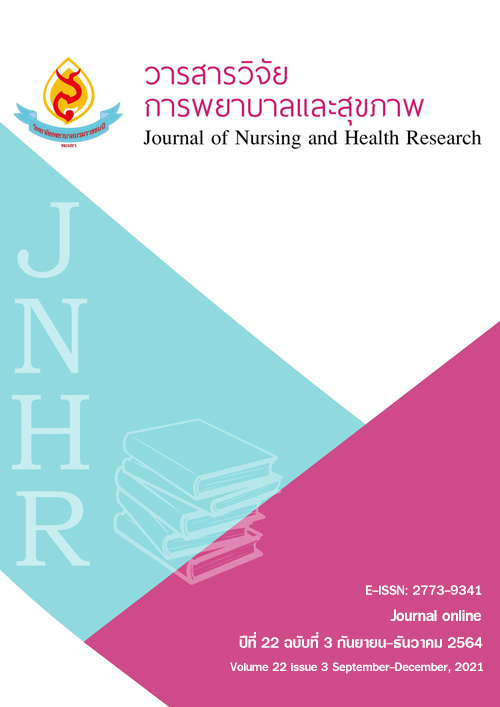ผลของโปรแกรมการสร้างเสริมสมรรถนะแห่งตนต่อการรับรู้ความยากง่ายและความมั่นใจ ในการประเมินภาวะโภชนาการเด็กและการใช้โปรแกรม KidDiary ของครูพี่เลี้ยงศูนย์พัฒนาเด็กเล็กกลุ่มชาติพันธุ์
คำสำคัญ:
สมรรถนะแห่งตน, การประเมินภาวะโภชนาการ, โปรแกรม KidDiary, ครูพี่เลี้ยง, ศูนย์พัฒนาเด็กเล็กกลุ่มชาติพันธุ์บทคัดย่อ
การวิจัยกึ่งทดลอง แบบสองกลุ่มวัดก่อนและหลังการทดลอง (two-group, pretest-posttest design) นี้มีวัตถุประสงค์เพื่อศึกษาผลของการใช้โปรแกรมการสร้างเสริมสมรรถนะแห่งตนต่อการรับรู้ความยากง่ายและความมั่นใจในการประเมินภาวะโภชนาการเด็กและการใช้โปรแกรม KidDiary ในกลุ่มตัวอย่าง ครูพี่เลี้ยงศูนย์พัฒนาเด็กเล็กกลุ่มชาติพันธุ์ ในอำเภอแม่ฟ้าหลวง จังหวัดเชียงราย ซึ่งถูกเลือกแบบเจาะจง จำนวน 78 รายแบ่งเป็นกลุ่มทดลองและกลุ่มควบคุม จำนวน 39 ราย ในแต่ละกลุ่ม ทำการศึกษาตั้งแต่ 1 พฤษภาคม–30 พฤศจิกายน 2563 เครื่องมือที่ใช้ประกอบด้วย 1) เครื่องมือที่ใช้ในการเก็บรวบรวมข้อมูล ได้แก่ แบบสอบถามการรับรู้ความยากง่าย และความมั่นใจในการประเมินภาวะโภชนาการเด็กและการใช้โปรแกรม KidDiary 2) เครื่องมือที่ใช้ในการทดลอง คือโปรแกรม KidDiary และโปรแกรมการสร้างเสริมสมรรถนะแห่งตนโดยใช้กรอบแนวคิดทฤษฎีการรับรู้ความสามารถของตนเองของแบนดูรา วิเคราะห์ข้อมูลโดยใช้สถิติ เชิงบรรยายและสถิติเชิงเปรียบเทียบ independent t-test และ paired t-test ผลการวิจัยพบว่าภายหลังการเข้าร่วมโปรแกรม ครูพี่เลี้ยงศูนย์พัฒนาเด็กเล็กกลุ่มทดลองมีค่าคะแนนเฉลี่ยการรับรู้ความยากง่ายและระดับความมั่นใจในการประเมินภาวะโภชนาการเด็กมากกว่าก่อนเข้าร่วมโปรแกรมและมากกว่ากลุ่มเปรียบเทียบอย่างมีนัยสำคัญทางสถิติ (p<.05) ผลการวิจัยแสดงให้เห็นว่าโปรแกรมนี้ช่วยส่งเสริมให้ครูพี่เลี้ยงสามารถประเมินภาวะโภชนาการเด็กได้อย่างถูกต้องและมีความมั่นใจยิ่งขึ้น ดังนั้นจึงควรมีการส่งเสริมให้นำโปรแกรมดังกล่าวไปใช้ในการฝึกอบรมครูพี่เลี้ยงในศูนย์พัฒนาเด็กเล็กชาติพันธุ์อื่นๆ เพื่อพัฒนาศักยภาพให้กับครูพี่เลี้ยงศูนย์พัฒนาเด็กเล็ก
เอกสารอ้างอิง
กรมส่งเสริมการปกครองส่วนท้องถิ่น. (2559). มาตรฐานการดำเนินงานศูนย์พัฒนาเด็กเล็กขององค์กรปกครองส่วนท้องถิ่น ประจำปีงบประมาณ พ.ศ. 2559. กระทรวงมหาดไทย
กาญจนา คำสมบัติ, ทรงศักดิ์ สองสนิท และประวิทย์ สิมมาทัน. (2562). การส่งเสริมการรับรู้ความสามารถของตนเองกับกิจกรรมการเรียนการสอน. วารสารวิจัย มหาวิทยาลัยขอนแก่น (ฉบับบัณฑิตศึกษา) สาขามนุษยศาสตร์และสังคมศาสตร์, 7(3), 69-78.
ประดับ ศรีหมื่นไวย, นฤมล เอื้อมณีกูล, ปัญญรัตน์ ลาภวงศ์วัฒนา และ อาภาพร เผ่าวัฒนา. (2560). ผลของโปรแกรมการพัฒนาครูผู้ดูแลเด็กในการส่งเสริมพัฒนาการเด็กวัยเรียน ในศูนย์พัฒนาเด็กเล็ก. วารสารพยาบาลสาธารณสุข, 31(2), 127-143.
ญาณิศา อินทรักษ์ และดวงใจ ชนะสิทธิ์, (2558). การปฏิบัติงานด้านวิชาการของศูนย์พัฒนาเด็กเล็กสังกัดองค์กรปกครองส่วนท้องถิ่น จังหว้ดสมุทรสาคร. วารสารศิลปกรศึกษาศาสตร์วิจัย. 7(2), 317-334.
ศูนย์เทคโนโลยีอิเล็กทรอนิกส์และคอมพิวเตอร์แห่งชาติ. (2562). โปรแกรมบันทึกและคัดกรองการเจริญเติบโตและพัฒนาการเด็กปฐมวัย (KidDiary). สืบค้นวันที่ 7 เมษายน 2564, จาก http://www.kiddiary.in.th/
สายสุดา ปั้นตระกูล และบุญญลักษม์ ตำนานจิตร. (2562). การใช้เครือข่ายสังคมออนไลน์ด้านวิชาการของครูผู้ดูแลเด็ก. วารสารครุศาสตร์, 13(2), 43-60.
สุกัญญา บัวศรี, อนงค์ สุนทรานนท์, สุนี หลี่จา และพนมวรรณ วิชาชัย. (2560). ภาวะโภชนาการและการพัฒนาการประเมินภาวะโภชนาการของเด็กในศูนย์พัฒนาเด็กเล็ก ตำบลเทอดไทย อำเภอแม่ฟ้าหลวง จังหวัดเชียงราย. การประชุมโภชนาการแห่งชาติครั้งที่ 1: อาหารสุขภาพเพื่อชีวิต. ศูนย์นิทรรศการและการประชุมไบเทคบางนา.
องค์การบริหารส่วนตำบลเทอดไทย. (2562). แผนพัฒนาท้องถิ่น 4 ปี (พ.ศ.2561-2564). สืบค้นวันที่ 7 เมษายน 2564, จาก http://www.therdthai.go.th/main.php?id=1
Bandura, A. (1977). Self-efficacy: Toward a unifying theory of behavioral change. Psychological Review, 84(2), 191-215.
Bandura, A. (2006). Guide for constructing self-efficacy scales. In F. Pajares & T. Urdan (Eds.), Self-efficacy beliefs of adolescents, 5, 307-337.
Burns, N., & Grove, S. K. (2013). The practice of nursing research: Appraisal, synthesis, and generation of evidence (8th ed.). Elsevier.
Conkle, J., Ramakrishnan U., Flores_Ayala R., Suchdev P. S. & Martorell, R. (2017). Improving the quality of child anthropometry: Manual anthropometry in the Body Imaging for Nutritional Assessment Study (BINA). PLoS ONE, 12(12), 1-13. DOI: 10.1371/journal.pone.0189332.
De Onis, M., Onyango, A. W., Van den Broeck, J., Chumlea, W. C. & Martorell, R. (2004). Measurement and standardization protocols for anthropometry used in the construction of a new international growth reference. Food and Nutrition Bulletin, 25(1), 27–36. doi.10.1177/15648265040251S104
Nanayakkara, J., Margerison, C. & Worsley, A. (2021). Teachers' self-efficacy beliefs in teaching food and nutrition subjects in Australian secondary schools, Health Education, 121(3), 311-321. https://doi.org/10.1108/HE-01-2021-0003
O’Dea, J. A. (2016) Evaluation of Nutrition and Physical Activity Knowledge, Attitudes, Self Efficacy and Behaviors in Teachers and Children after Implementation of the “Healthy Active Kids” Online Program in Australian Elementary Schools. Health, 8, 293-303. doi.10.4236/health. 2016.84031
Tshifhiwa, T. C., Xikombiso G. M., Lindelani F. M. & Ngoako S. M. (2014). Knowledge and practices of pre-school teachers on growth monitoring program-South Africa. Health Promotion International. 30(1), 50-55. Doi.410.1093/heapro/dau084
World Health Organization. (2006). Multicentre growth reference study group enrolment and baseline characteristics in the WHO multicentre growth reference study. Acta Paediatrica. Supplementum, 450, 7–15.
ดาวน์โหลด
เผยแพร่แล้ว
รูปแบบการอ้างอิง
ฉบับ
ประเภทบทความ
สัญญาอนุญาต
ลิขสิทธิ์ (c) 2021 วารสารวิจัยการพยาบาลและสุขภาพ

อนุญาตภายใต้เงื่อนไข Creative Commons Attribution-NonCommercial-NoDerivatives 4.0 International License.



